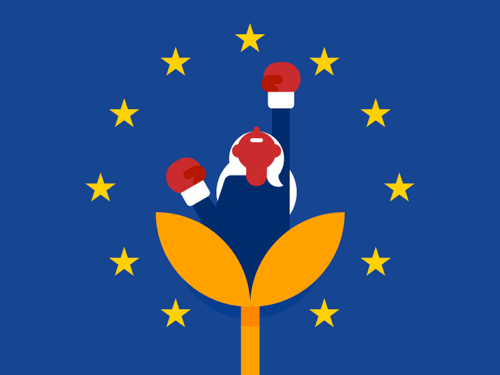HR and Big Data: a match made in heaven?
May 28, 2019
4 mins

What to do about data privacy in the age of analytics? How should companies balance their desire to track their employees’ activities and productivity with employee demands (and potentially, even the right?) to privacy at work, and autonomy of action? Tracking and data gathering may provide valuable insights to employers and incentivize greater productivity, but might also lead to self-censorship at work by employees that ultimately stifles creative thinking and problem-solving.
Developments in AI and big data management have reshaped the way we live and work. Companies looking to attract the best and the brightest employees are getting up to speed with this technology, adopting tools like TalentBin & Evolve that monitor applicants’ interests and personality traits to help recruiters find the best person available for the job. In fact, even the most basic LinkedIn-hosted recruitment process is heavily reliant on AI for efficiency.
But this new technology has to be coupled with a new way of working. Chris Havrilla, VP of HR technology at Bersin by Deloitte, says that HR staff “need to shift their mindset to be more data-driven, and to see themselves as human teachers for the machine.” Those new technologies will help companies make better decisions when it comes to hiring and managing staff, as well as measuring their productivity. Clare Barclay, chief operating officer at Microsoft UK, echoes the idea that “embracing AI is now an essential element of any successful business strategy and in HR it can deliver rapid value.”
That means data gathered and managed by HR is quickly growing into one of the most valuable assets companies have. A recent study from the Economist Intelligence Unit reported that 82% of organizations planned to either start using—or increase their use of—big data in HR before the end of 2018. Faced by these figures, HR departments are likely to start “trading” big data as a valuable currency that contributes to company health and growth, as well as driving profits.
Embracing the data-driven mindset
But are HR departments prepared for such a radical role change? It doesn’t seem like it. While more than 97 percent of HR departments gather metrics, it is reported that 95.5 percent of HR professionals experience problems when gathering and analyzing HR metrics. In most cases, outdated data systems and inefficient training affect their ability to handle the data and get the best out of new technology. To be successful in the future, HR professionals must now learn how to gather, analyze and store all sorts of data while safeguarding that information from possible data breaches.
With the GDPR in effect, HR managers are tasked with the ethical responsibility of handling the data they need to inform their decisions, knowing that they can be held accountable for all the personal data they store, even when it has been collected and processed by using third-party services such as LinkedIn. In other words, HR has assumed its place at the epicenter of intra-company data circulation; any data breach or violation of data regulations can jeopardize both the company and the employees trust in it.
If HR is to survive this data revolution, radical changes are necessary. The first is to invest in technology that will enable HR departments to effectively capture and analyze data they need to make informed decisions about the workforce. That technology is already widely available and can range from simple insight metrics applications to fully integrated solutions and tools such as TriNet & HireVue. TriNet’s Vice President of Analytics David McMath has defined the tool’s mission as “the freedom to manage HR on the go can help businesses attract and retain key employees while operating in a more effective and efficient manner.”
The new challenges of Europe’s GDPR
Beyond learning how to make the most of the latest tools, another factor HR departments need to take into account is Europe’s GDPR—a piece of legislation that came into effect in May 2018 that harmonizes data privacy laws across Europe. According to David Carroll, associate professor of media design at The New School, the GDPR presents “a real chance to renegotiate the terms of engagement between people, their data, and the company.’’ While critics see it as unnecessarily slowing down growth, the GDPR could be the perfect opportunity for HR departments to train current and future employees to handle data in a safe and responsible way. This could also boost creativity within the company: when employees know their private data is in safe hands, they’re bound to feel free to express their individuality within the company’s structure—and likely to perform better.
Of course, the GDPR is not a panacea; it has been the subject of strong criticism from companies, NGOs and even personal privacy activists who are concerned that its vague definition of ‘personal data’ might allow for misinterpretation and abuse—not to mention the financial setback suffered by small businesses and organizations if they were to be handed a fine equivalent to 4% of a company’s annual revenue. To meet the GDPR’s requirements, companies need to invest heavily in the necessary system changes, especially in IT and HRM, as well as appoint a special data protection officer. But that is costly and takes time. In reality, even giants like Facebook or Google haven’t yet managed to become fully GDPR-compliant.
Towards AI powered by human intuition and creativity
We are entering an age of artificial intelligence powered by the human mind and intuition. By combining work and human creativity, HR professionals are able to create solutions and ideas that are tailored to the company’s needs. This requires professional training in artificial intelligence and awareness of the latest developments in big data.
If used correctly, artificial intelligence won’t just lead to more growth and happier employees—it is also set to transform the very core of how human talent is managed towards a more creative, effective and intuitive way of working.
In collaboration with Are We Europe.
Illustration: Eddie Stok

More inspiration: Employer branding

Is cultural add the new cultural fit?
A growing number of companies are swapping the question “What’s a good fit?” for “What’s missing?”
Jun 28, 2023

How to make your Glassdoor page an asset
50 million unique visitors flock to the Glassdoor social platform, making it the second most popular job site in the United States.
Feb 23, 2021

Recruitment marketing: the future of talent acquisition?
Recruitment marketing is the combination of digital technology and recruitment techniques to acquire high-quality talent.
Sep 16, 2019

How blockchain could transform the core of HR
Accelerate fundamental HR processes, secure payroll, verify candidate's informations ... what blockchain brings to HR.
Aug 12, 2019

The American Dream in Europe?
This study highlights a global reflection on the new challenges of the entrepreneurial culture in France and the ecosystem that accompanies it.
Aug 09, 2019
Inside the jungle: The HR newsletter
Studies, events, expert analysis, and solutions—every two weeks in your inbox

